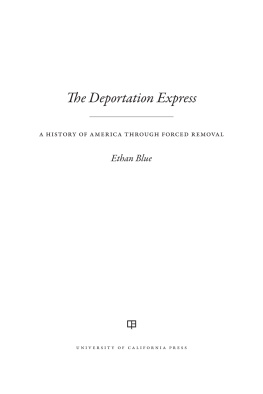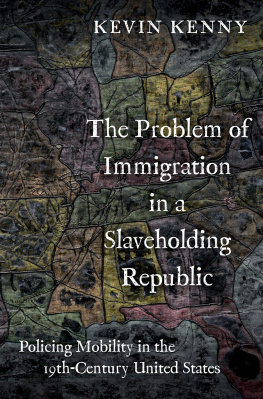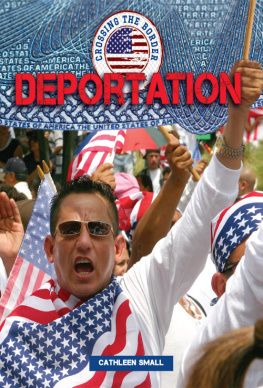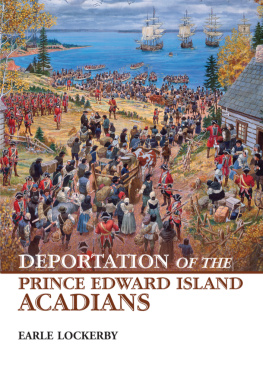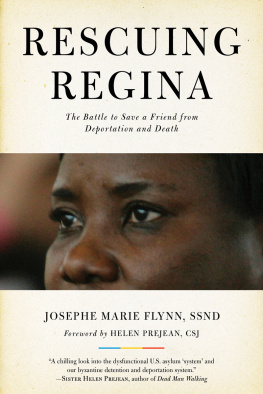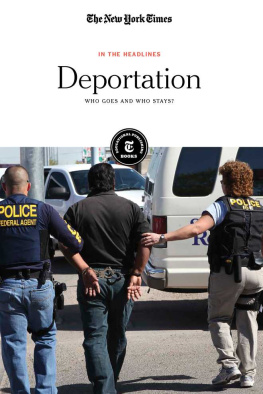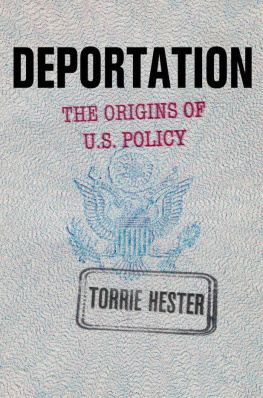ACKNOWLEDGMENTS
Most of this book was written on unceded and sovereign Wahdjuk Nyoongar boodja, where I have lived since 2005. Before that, I was raised on Coast Miwok land. I have benefited from being a settler/invader twice over, at least. My own travel from the United States to Australia for work was difficult. I missed friends and family, my children were (and are) distant from their grandparents, and its hard to get back to US archives and scholarly communities. But mine can only count among the most privileged migrations in the world.
I arrived in Perth as a married, cisgender, straight white man, whose migration was sponsored by a prestigious employer. The Australian government judged my health to be adequate, and my criminal recordafter a misstep when the FBI said my fingerprints were unclassifiablewas clean enough that I arrived with enormously elusive permanent resident status in a nation deeply structured by settler colonial violence and anti-immigrant animus. I am grateful to my friends, comrades, aunties, and uncles in and around the First Nations Deaths in Custody Watch Committee for helping me to better understand what it means to struggle for justice in this land and beyond. I have been particularly grateful for the opportunity to learn from and to walk together with Uncle Ben Cuimermarre Taylor AM, Auntie Helen Corbett, Auntie Carolyn Kelly-Lewis, Auntie Carol Roe, Anne Annear, Paul Kaplan, and the late Marc Newhouse.
Friends, colleagues, and students gave invaluable feedback on papers, chapter drafts, in classes, and just in passing. Some are still at the University of Western Australia, while others have moved on. Thanks to Milda Whitaker, Richard Small, Michelle Tucson, and Traci Taylor, without whom the university and the School of Arts could not function. Thanks too to Clarissa Ball, David Barrie, Harry Blagg, Andrew Broertjes, Sue Broomhall, Fausto Butta, Phil Chilton, Ann Curthoys, Ned Curthoys, Sarah Collins, Rob Cover, Tanya Dalziell, John Docker, Kirk Essary, Giuseppe Finaldi, Farida Fozdar, Rahul Gariola, Andrea Gaynor, Sam Han, Tauel Harper, Nick Harney, Tony Hughes DAeth, Shino Konishi, John Kinder, Michael Levine, Alexandra Ludewig, Jane Lydon, Jeremy Martens, Shalmalee Palekar, Lorenzo Polizotto, Nadia Rhook, David Savat, Bill Taylor, Kati Tonkin, Jacqueline Van Gent, Richard Vokes, and Brenda Walker. Gordon Flake at the Perth-US Asia Center has been a solid advocate since his arrival in Perth. Lauren Caterson, Amy Pracilio, and Vanessa Sofoulis provided wonderful research assistance. A University of Western Australia research grant, teaching relief, and study leave provided crucial time and space for thinking, reading, and writing. The Australian Academy for the Humanities is waging a valiant struggle to support the humanities and education in Australia, and it also supported this project at a very early stage with a Traveling Fellowship.
Further afield, and thanks to those travels, Ive benefited from support and conversations that are too many to mention. I was fortunate to be a research fellow at the University of Michigans Eisenberg Institute for Historical Studies, whose participants demonstrated a remarkable model of university life. Thanks to Ron Suny, Karen Auerbach, Kevin Gaines, Matt Lassiter, Gregory Parker, Ronen Steinberg, Alexandra Minna Stern, Penny M. Von Eschen, and Steven Ward. Stephen Berrey heard the earliest musings and read the full manuscript at a late stage and deserves special note.
I was also lucky to spend a sabbatical at Stanford Universitys Center for Spatial and Textual Analysis. Zephyr Frank, Celena Allen, Nicholas Bausch, Matt Bryant, Richard White, Gabriel Wolfstein, and Erik Steiner were gracious hosts while I absorbed as much as I could about spatial history. Kimberly Krebs, Gabriela Levikow, Fangzhou Liu, and Yesid Castro poured over documents, helped build spatio-temporal databases, and offered ways to think through how to visualize them.
Dedicated archivists helped the project immensely. Zack Wilske and Marian Smith, historians at US Citizenship and Immigration Services, were generous with their knowledge of the Department of Labor and Immigration records, and Bill Creech shared more of the same on the ground at the National Archives in Washington, DC. Anna Kaplan and Robb Hill helped with research at the National Archives when I could not be there myself. Cara Moore, an archivist at the National Archives and Records AdministrationSaint Louis branch, offered outstanding support from afar. Kate Hutchins and Julie Herrada guided me through the riches at the Joseph A. Labadie Collection at the University of Michigan. Thanks also to Marje Schuetze-Coburn and Joy Kim at the University of Southern California East Asian Librarys Henry DeYoung Collection, Mary Wallace at Wayne State Universitys Walter P. Reuther Library, Simon Elliott with University of California at Los Angeles Charles E. Young Library Special Collections, Scott Sandberg at Indiana University Northwests Calumet Regional Archives, Carlos Cortez at the University of Texas at San Antonio, and Daniel Hartwig and Tim Noakes at Stanford University Library Special Collections. And while I was in Washington, DC, Steven Galpern and Patti Simon provided wonderful friendship and accommodation.
The distance between Perth and most other venues means that conversations at conferences, with editors and collaborators, have been all the more precious. Many thanks to Thomas Adams, Norwood Andrews, Luis Alvarez, Benjamin Balthasar, Brian Benhken, Rachel Ida Buff, Robert Chase, Suchetana Chattopadhyay, Ben Chappell, Frances Clarke, Clare Corbould, Leon Fink, Mark Finnane, Neil Foley, Ruth Wilson Gilmore, Gareth Griffiths, Sarah Gleason-White, Tanya Golash-Boza, Cindy Hahamovitch, Christina Heatherton, Charles Heller, David Hernndez, Kelly Lytle Hernndez, Madeline Hsu, Moon-Ho Jung, Andy Kaladelfos, Daniel Kanstroom, Marilyn Lake, Julian Lim, Jenna Loyd, Ann McGrath, Mike McDonnell, Karl Hagstom Miller, Klaus Neumann, Phillip Mead, Mae Ngai, Naomi Paik, Sharon Pickering, Andonis Piperogolou, Lorenzo Pezzani, Jean Pfaelzer, Samuel K. Roberts, Gilberto Rosas, Chantel Rodriguez, Scott Saul, Micol Seigel, Tyrone R. Simpson, Nayan Shah, Yorick Smaal, Gregory Smithers, Patrick Timmons, Andrew Urban, Lea VanderVelde, William Walters, Leanne Weber, Shane White, Daniel Widener, Elliott Young, and Kenyon Zimmer.

